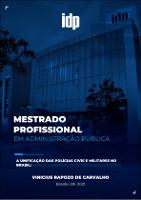Use este identificador para citar ou linkar para este item:
https://repositorio.idp.edu.br//handle/123456789/4124| Título: | A unificação das polícias civis e militares no Brasil: debate e entraves no Congresso Nacional |
| Autor(es): | Carvalho, Vinicius Rapozo de |
| Orientador(es): | Lemos, Leany |
| Palavras-chave: | Unificação das políticas;Segurança pública;Poder legislativo |
| Data de submissão: | 2021 |
| Citação: | CARVALHO, Vinicius Rapozo de Carvalho. A unificação das polícias civis e militares no Brasil: debate e entraves no Congresso Nacional. 2023. 70 f. Dissertação (Mestrado em Economia) — Instituto Brasileiro de Ensino, Desenvolvimento e Pesquisa, Brasília, 2021. |
| Resumo: | O objetivo deste estudo é identificar os obstáculos para a aprovação de uma proposta legislativa de unificação das polícias civis e militares, visto que o parlamento tem se mostrado rígido às inúmeras tentativas de transformação do modelo de polícia estadual no Brasil. As instituições envolvidas neste trabalho de pesquisa são especificamente os policiais civis e militares do Brasil. Há um consenso entre os agentes envolvidos que aponta para a ineficiência na formulação de um projeto de mudança estruturante e que seja capaz de alterar positivamente os índices de resolutividade de crimes complexos. Na maioria dos estados a taxa é baixíssima fazendo com que a população de modo geral não tenha confiança nas polícias. Essa falta de credibilidade somada as brigas corporativas existentes entre elas, lutas por melhorias pontuais, mas nenhuma estruturante, tem desmotivado, desestimulado e acirrado a rixa interna entre os próprios pares. Fato esse que tem levado o assunto para dentro do congresso nacional, para tentar de alguma forma fomentar a discussão de mudança no legislativo federal. Por esse motivo, existem desde a Constituição Federal de 1988 inúmeros projetos de lei, com iniciativa na Câmara dos Deputados e Senado Federal, com o objetivo de reformar ou adequar a segurança pública nacional aos anseios da sociedade. Temas como a unificação das polícias estaduais, desmilitarização, padronização da deontologia em âmbito nacional, entrada única em cada instituição não tem sido aceita pelos grupos de pressão que circulam pelos corredores do parlamento, sem contar os representantes das duas polícias que foram eleitos para defenderem os interesses corporativos das instituições que se somas aos que não querem ver a coisa mudar institucionalmente. Nesse trabalho usamos o método e tipo de pesquisa misto, com características qualitativas e quantitativas, o tipo de pesquisa utilizado foi o exploratório com a técnica de coletas de dados documentais dos artigos e a pesquisa bibliográfica. No desenvolvimento do trabalho abordaremos o comportamento legislativo e grupos de pressão, modelos de polícia no mundo e no Brasil, a unificação das polícias civis e militares e os entraves para o debate das propostas no Congresso Nacional. Concluímos esse trabalho de pesquisa com uma percepção completamente diferente da que supúnhamos. A unificação das polícias civis e militares, sozinha não resolve os problemas da segurança pública. |
| Abstract: | The objective of this study is to identify the obstacles to the approval of a legislative proposal for the unification of the civil and military police, since the parliament has shown itself to be rigid to the countless attempts to transform the state police model in Brazil. The institutions involved in this research work are specifically the civil and military police in Brazil. There is a consensus among the agents involved that points to the inefficiency in the formulation of a structuring change project that is capable of positively altering the resolution rates of complex crimes. In most states the rate is very low making sure the general population doesn't have confidence in the police. This lack of credibility added to the existing corporate struggles between them, struggles for specific improvements, but no structuring, has discouraged, discouraged and intensified the internal feud between the peers themselves. This fact has taken the matter into the national congress, to try to somehow encourage the discursion of change in the federal legislature. For this reason, there have been numerous bills since the federal constitution of 1988, with initiative in the House of Representatives and the Federal Senate, with the aim of reforming or adapting national public security to the longings of society. Topics such as the unification of the state police, demilitarization, standardization of deontology at the national level, unique entry into each institution has not been accepted by the pressure groups that circulate through the corridors of parliament, not to mention the representatives of the two police officers who were elected to defend the corporate interests of institutions that are sums to those who do not want to see the thing change institutionally. In this work we used the mixed method and type of research, with qualitative and quantitative characteristics, the type of research used was exploratory with the technique of document data collection of articles and bibliographic research. In the development of the work, we will address the legislative behavior and pressure groups, police models in the world and in Brazil, the unification of the civil and military police and the obstacles to the debate of proposals in the national congress. We conclude this research work with a completely different perception from what we assumed. The unification of the civil and military police alone does not solve the problems of public security. |
| URI: | https://repositorio.idp.edu.br//handle/123456789/4124 |
| Aparece nas coleções: | Mestrado Profissional em Administração Pública |
Arquivos associados a este item:
| Arquivo | Descrição | Tamanho | Formato | |
|---|---|---|---|---|
| DISSERTACAO_ VINICIUS RAPOZO DE CARVALHO _MESTRADO_2021.pdf | 1.84 MB | Adobe PDF |  Visualizar/Abrir |
Os itens no repositório estão protegidos por copyright, com todos os direitos reservados, salvo quando é indicado o contrário.
